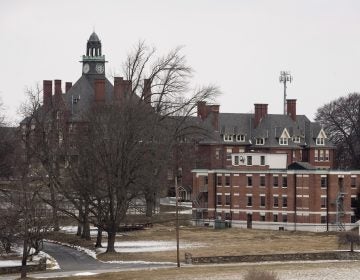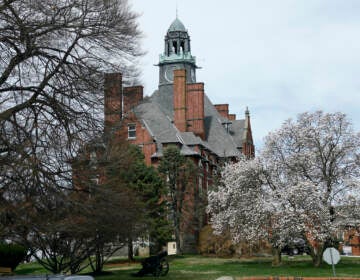Advocates sue Pa. officials, say they failed to catch major problems at Glen Mills Schools
The suit holds two Pa. departments responsible for constitutional violations and other infractions against children sent to the prominent Delaware County reform school.

Maura McInerney, legal director fo Education Law Center, talks about a class action lawsuit against Glen Mills Schools which charges that boys at the reform school were abused and deprived of education. She is joined by Chief Legal Officer Marsha Levick and Michael McGinley, a partner at Dechert LLP. (Emma Lee/WHYY)
A new lawsuit targets two top state officials over failing to protect youth placed in the Glen Mills Schools, a reform school that once housed 1,000 boys.
Pennsylvania’s secretaries of education and human services failed to properly monitor the facility where rampant abuse was found, claims the class-action suit filed Thursday.
The suit holds the departments responsible for constitutional violations and other infractions against children sent to the prominent Delaware County reform school for adjudicated youth after a newspaper investigation detailed decades of abuse claims.
State officials pulled the license of Glen Mills last week.
The lawsuit seeks a minimum of $10 million in damages. The lawyers spearheading the case say they hope it will prompt Pennsylvania to tighten its regulation of reform schools that get referrals from the state court system.
“If we as a state are going to take children into our care and into our custody because they have done something wrong, we have an obligation to treat them, frankly, as if we were their parents,” said Marsha Levick, chief legal officer of Juvenile Law Center.
Glen Mills came under scrutiny after an investigation by the Philadelphia Media Network found a history of violence and a culture of intimidation. At the time, Glen Mills — which housed boys from around the world — was the oldest reform school in the country. It was once regarded as a bright light in America’s justice system for juveniles.
After the investigation went public, counties across the state pulled students from the school. Philadelphia, for instance, withdrew 51 boys; Allegheny County withdrew 18 boys; and Erie County withdrew another nine.
State officials conducted their own follow-up and decided to pull the school’s licenses.
The lawsuit implies Pennsylvania regulators should have detected and corrected problems at Glen Mills before media coverage prompted further examination. Levick said state oversight wasn’t strict enough, and that officials weren’t aggressive enough within the protocol already established.
“For years, PA-DHS defendants knew about the routine violence against youth at Glen Mills facilities yet failed to take any meaningful action to curtail it and protect the hundreds of youth placed there,” according to the complaint.
The suit — which has four named plaintiffs representing a class of former students — says there were 21 documented cases of abuse at Glen Mills between March 10, 2014, and January 12, 2017, and another 15 cases of “administrative irregularities.”
Glen Mills had to agree to a “plan of correction” after each of the abuse cases, but the plaintiffs lawyers say the language was often boilerplate and lifted from prior incidents.
“No steps are outlined that show how abuse, mistreatment or corporal punishment will be eliminated,” the lawsuit alleges.
The Pennsylvania Department of Human Services also inspects residential facilities like Glen Mills once a year for compliance, although it can conduct more inspections if it chooses.
The lawsuit also names Pedro Rivera, the state’s secretary of education, alleging his department failed to ensure Glen Mills provided real instruction.
Plaintiffs say the school “deprived” students of an education by shuttling them into “self-directed computer-based” courses or asking them to “forgo a high school education entirely and review a GED book.”
While this happened, the lawsuit says, the Department of Education played a limited role. The department visited once every six years to check for compliance with special education laws. Those checks came “in accordance with its cyclical monitoring program which relies heavily on self-reporting and review of paper documentation,” the plaintiffs said. And the most recent visit, in 2015, found no problems, according to attorney Maura McInerney, legal director for the Education Law Center.
“They should have found problems,” McInerney said.
The plaintiffs say Glen Mills fell short of the federal special-education law in several ways, often failing to provide the kind of support students received at their old schools. Instead, the lawsuit alleges, Glen Mills tried to squeeze special-education students into its “one-size-fits-all” program for special education.
The advocates behind the suit hope it will be a wake-up call for state officials, and that it will force them to re-evaluate how closely they monitor schools for juvenile offenders.
“The departments will review the complaint, but cannot comment on pending litigation,” said Ali Fogarty, a spokeswoman for the state Department of Human Services.
Glen Mills said it learned about the lawsuit through media reports.
“Our attorneys are now evaluating the suit, which will take some time due to its length. The school will comment on it once it has had time to evaluate it,” said spokeswoman Aimee Tysarczyk in a statement. “We look forward to our appeal process with the state and encourage anyone who wants to read our side of the story to review those documents, which are and will continue to be available to the public.”
WHYY is your source for fact-based, in-depth journalism and information. As a nonprofit organization, we rely on financial support from readers like you. Please give today.





